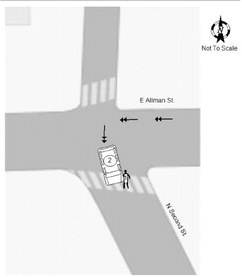Taylor County horse tests positive for Eastern Equine Encephalitis virus
The Taylor County Health Department reports that a horse in Taylor County has tested positive for eastern equine encephalitis (EEE), which is a rare but serious infection caused by the EEE virus.
This is the first confirmed EEE virus activity in Taylor County this year. One person with EEE disease has been reported in the state earlier this year, but this person most likely acquired their infection during travel to another state.
EEE virus is spread to humans, horses, and other animals through the bite of an infected mosquito. Mosquitoes acquire EEE virus by feeding on infected birds.
The virus is not spread person to person or directly between animals or between animals and humans. The presence of a horse with EEE, however, confirms that there are mosquitoes in the area infected with EEE that can spread the virus to people and other animals.
Some people with EEE may develop fever, headache, chills, and vomiting. The illness may become severe resulting in encephalitis (inflammation of the brain), disorientation, seizures, coma, or death. Approximately 30% if people who develop severe EEE disease will die, and those who do survive often have long-term neurologic problems.
Adults over 50 years old and children under 15 years old are at the greatest risk for developing severe EEE disease. There is no specific vaccine or treatment for EEE illness available for people.
Signs of EEE infection in horses include depression, loss of appetite, drooping eyelids and lower lip, blindness, paralysis, and death. Horse owners can vaccinate their horses against EEE virus to protect them from becoming ill. Follow these tips to protect yourself and your family against mosquito bites: Avoid Mosquito Bites
• Apply an insect repellent with DEET, picaridin, oil of lemon eucalyptus, or IR3535 to exposed skin and clothing.
• Prior to heading outdoors, treat clothing with permethrin; do not apply permethrin directly to skin.
• Consider rescheduling outdoor activities that occur during evening or early morning hours, when mosquitoes are most active.
• Wear long-sleeves, long pants, and socks when outdoors to help keep mosquitoes away from your skin.
Mosquito-Proof Your Home
• Make sure window and door screens are intact and tightly-fitted to prevent mosquitoes from getting into your home.
• Prevent mosquitoes from breeding around your home by removing stagnant water from items around your property, such as tin cans, plastic containers, flower pots, discarded tires, roof gutters, and downspouts.
• Turn over wheelbarrows, kiddie pools, buckets, and small boats such as canoes and kayaks when not in use.
• Change the water in bird baths and pet dishes at least every three days.
• Clean and chlorinate swimming pools, outdoor saunas, and hot tubs; drain water from pool covers.
• Trim or mow tall grass, weeds, and vines since mosquitoes use these areas to rest during hot daylight hours.




